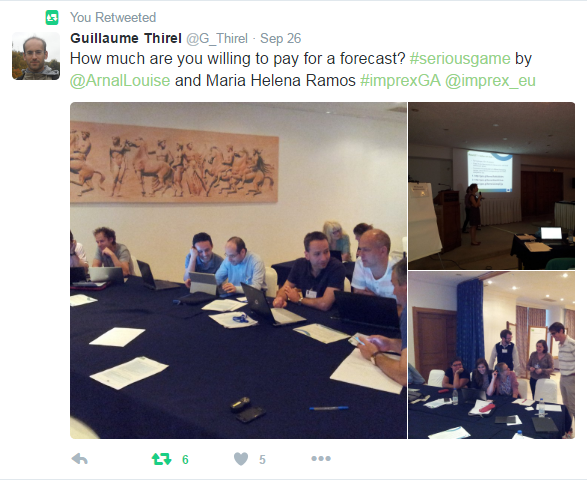The first online HEPEX game: try it yourself!
Contributed by Louise Arnal,University of Reading & ECMWF
On September 26, 2016, at the IMPREX (IMproving PRedictions and management of hydrological EXtremes; a Horizon 2020 project) General Assembly in Crete, around 50 participants took part in an online educational game called “How much are you willing to pay for a forecast?” designed by researchers from the University of Reading, ECMWF, Irstea and colleagues.
 This game was originally created as a paper game to be played during the Ensemble hydro-meteorological forecasting session at the EGU Assembly in 2015. It was designed to contribute to the understanding of the role of probabilistic forecasts in decision-making processes and to look at the perceived value of the forecasts by the decision-makers for flood protection mitigation.
This game was originally created as a paper game to be played during the Ensemble hydro-meteorological forecasting session at the EGU Assembly in 2015. It was designed to contribute to the understanding of the role of probabilistic forecasts in decision-making processes and to look at the perceived value of the forecasts by the decision-makers for flood protection mitigation.
This was achieved by giving the participants a set of probabilistic forecasts of their river level, with which they had to decide whether to buy flood protection. The participants’ willingness-to-pay for probabilistic forecasts was also evaluated during the game through an auction, where forecasts were no longer given but sold, and in a limited number.
First results of the game
The game was played in its paper version at several workshops and conferences after its introduction at the EGU session in 2015, from which a total of 129 game sheets were collected and analysed.
And just to mention a few key results,
- the participants’ willingness-to-pay for a forecast showed that the value (or the usefulness) of a forecast depends on several factors, including the way users perceive the quality of their forecasts and link it to the perception of their own performances as decision-makers.
- Overall, the game has shown participants that the use and perceived benefit of probabilistic forecasts as a support of decision-making in a risk-based context is not straightforward.
- This demonstrates that there is still an essential need to provide comprehensive guidance on the use of probabilistic information for decision-making, by communicating the quality as well as the actual relevance of the information for improved decisions for various applications.
If this short overview sparked your curiosity, a paper on the game and its results was recently published in a HESS special issue (Arnal et al., 2016).
An online version: try and play it yourself
The game was played actively but we thought that it could be better if it was adapted as an online game. So, here you have the first HEPEX online game!
It plays a little bit differently from the paper game, but I’ll let you discover that by yourselves. All you need to play it is a computer or smartphone, an internet connection and a valid email address. Do you want to try it?
|
The online version of the game was played at several conferences and workshops, such as the ‘Using ECMWF’s Forecasts (UEF)’ workshop held at ECMWF in June 2016 and the IMPREX GA in September 2016 (not to mention all the tests that our colleagues from ECMWF and Irstea kindly accepted to do before its release). Please bear in mind that as new ideas arise we make further developments and adjustments. So feel free to contact me or leave a comment below!
Games are increasingly promoted and used to convey information of scientific relevance. We believe that they are a great way to foster learning, dialogue and action through real-world decisions, which allow the study of the complexities hidden behind real-world decision-making in an entertaining and interactive set up.
Both the paper and the online versions of the game are available from the HEPEX website, where you can find several other games. Just download and try them for your teaching, meetings and training!
November 1, 2016 at 10:50
@ArnalLouise tried at @imprex_eu GA and was fun and insightful
November 2, 2016 at 14:45
I’m glad you liked the game Johannes! It is always a great addition to a conference I think, to: boost the interaction between attendees, provide diversity from other more conventional methods to convey the information and communicate a scientific message.
November 1, 2016 at 12:16
@ArnalLouise Guess I need to test it a couple of times before playing it with students.
November 2, 2016 at 14:33
@Hydrology_WSL it would be great to play the game with students, I’d love to see the results! Always good to have a practice round 1st.